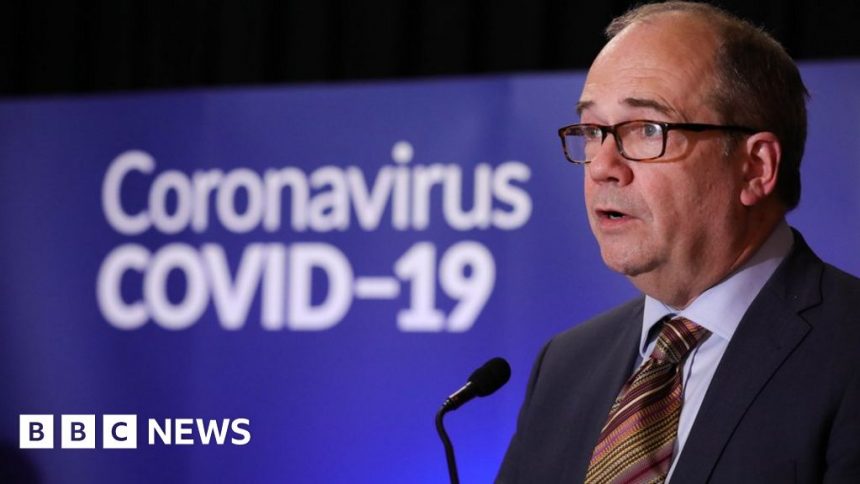Covid Inquiry: Political dysfunction criticised by NI chief medical officer
-
Published
Voices of those who lost loved ones to Covid
Political dysfunction and a legacy of mistrust hampered Northern Ireland’s preparedness for the pandemic, the Covid-19 Inquiry has been told.
The claims were made during the first day of hearings from Belfast.
More than 4,000 people in Northern Ireland died with the virus during the first two years of the pandemic.
Three weeks of hearings have started in Belfast and will feature senior politicians and bereaved families.
The inquiry will assess political decision-making, mental health and care homes as it gathers evidence about the UK’s response to the pandemic.
On Tuesday, the inquiry heard how Northern Ireland’s chief medical officer Prof Sir Michael McBride had been frustrated by Stormont politicians’ apparent lack of communication and had used a profanity to describe them.
It heard of a WhatsApp message to the then health minister Robin Swann.
Peter Wilcock KC, who represents the Northern Ireland Covid Bereaved Families for Justice Group said: “There is no doubt that these times were stressful for everyone involved.”
Warning this article contains language some readers may find offensive
He added:”And that may well be why in the Autumn of 2020, Northern Ireland’s chief medical officer Dr [Michael] McBride used uncharacteristically coarse language in exchanges with the Minister of Health when he wrote and I quote: ‘Dysfunctional bastards, how will we ever get through this with an enemy within, I have a good mind to walk off and leave them to it, as no doubt do you, but then those that really matter, those whom they seem to have forgotten they represent are really depending on us.”
Earlier, the inquiry heard the Northern Ireland Civil Service head, Jayne Brady, has questions to answer about the wiping of electronic devices by former executive ministers.
Counsel to the Inquiry, Clair Dobbin KC, queried why minutes of a meeting in The Executive Office were “altered” in order not to include a reference to ministers’ mobile phones being wiped.
Ms Dobbin said the Covid-19 Inquiry team had met The Executive Office officials in Belfast last year, but there had been no mention of wiping ministers’ phones.
The evidence presented to the inquiry painted Northern Ireland in a poor light in terms of how well political and health leaders were prepared for the pandemic.
Some families said it was a shocking and embarrassing day for Northern Ireland.
The lack of political respect felt between some politicians and the extent of how that impacted on keeping the public safe was laid bare.
Acrimonious executive meetings during those early days of 2020/2021 were common, leading to a delayed response when forming and delivering policy.
For journalists, the headlines kept coming.
It was revealed how then health minister Robin Swann told the executive that Northern Ireland had had seven weeks to prepare – others said the executive was “reacting and not leading”.
The chief medical officer’s WhatsApp to Mr Swann about political dysfunction paints a picture of disunity, disrespect, and disarray.
Northern Ireland was without doubt ill prepared.
That, according to the inquiry will be explored to see just to what extent it cost lives.
The KC said the situation had cost the inquiry “many valuable months” and it took another four months for the Executive Office to provide a report on the wiping of devices.
Ms Dobbin said her team then had to ask Jayne Brady for a further statement in order to find out what exactly had happened.
“Why did some ministers wipe their devices given that there was a clear instruction from Cabinet Office and instructions given internally within Northern Ireland government and by the Head of the Civil Service to retain data and information? That raises questions for ministers and for Ms Jayne Brady as well,” Ms Dobbin said.
Earlier, the UK-wide inquiry into the pandemic was told Northern Ireland’s fragile political system hampered its response to Covid-19.
Ms Dobbin said there was a siloing in decision-making and a “legacy of mistrust”.
Many bereaved families want answers about how so many lost their lives and whether any of the deaths could have been prevented.
Bereaved Families for Justice NI said they hoped lasting change will come from their testimony.
On Tuesday, Ms Dobbin, the counsel to the inquiry, said the latest statistics show that there were an estimated 4,075 excess deaths from 1 March 2020 to the end of the year 2022.
“A bleak tally of life lost during the pandemic,” she said.
She added that “relative to the spread of the virus Northern Ireland saw measures adopted relatively early” while England “had already reached a significant prevalence by the time measures came into place”.
The chair of the inquiry, Baroness Hallett, said the initial hearings would focus on key political decision-making in response to the pandemic in Northern Ireland.
Lauren Mallon’s uncle Raymond McAleese, who had Down’s syndrome, was 52 when he died.
“For him to die in the way that he did – it was traumatic for him most harrowingly but also traumatic for us as a family,” she said.
“He was just the most joyful soul and such a character. He brought so much life into all of our family.
“He was at the centre of our family life. When I was younger I was always putting on videos for him, and he loved cans of Coke.
“He was pure joy and pure light, and knowing him was the privilege of my life.”
Raymond was taken to hospital after contracting Covid-19 in 2021 and over the course of a few days, his condition deteriorated rapidly.
“Mum got to Antrim Area Hospital at 06:31 but he had died at 06:29, so that was just cruel,” Lauren said.
“The biggest thing about my uncle was that he had no rights in life, and he also had no rights in death.
“He died holding the hand of a nurse, and I suppose we were lucky in that way, because others didn’t get that.”
On what she hopes to get from the Covid Inquiry, Lauren said she wanted to ensure her uncle’s life and death lead to legislative change, particularly in Northern Ireland but also across the rest of the UK.
“Hopefully other families in our position – well, hopefully other families won’t have to be in our position,” she said.
“Our most vulnerable people were let down in the pandemic – they were failed – and I don’t want anyone else to go through that.”
When the pandemic hit, Martina Ferguson spent nine months trying to visit her mother Ursula Derry, who had dementia, inside her care home.
Due to restrictions she had to stay outside.
“Mummy was physically and emotionally extremely vulnerable,” said Martina.
“She had advanced dementia and, like many others, there’s no doubt she must have felt lonely, abandoned and distressed at the enforced separation from her family.
“I feel it’s been the biggest human rights crisis. My mummy’s human rights, I feel, were violated – my human rights. Everybody in our bereaved group feel their rights were violated – and it didn’t need to be like this.
In 2021, Ursula died in hospital after contracting the virus. Martina was by her side.
“It was explained to me that my mummy would be wrapped in a sheet and be put into a body bag, and I had to challenge that,” she said.
“I said I wanted my mummy washed, so a nurse came in she helped me and I spent a couple of hours washing my mummy’s body.
“So that kind of thing, that experience, is an experience I will never ever forget.
“But I got to dress my mummy. When the time came for her to go in a body bag, I had to leave, I just couldn’t see that.”
Martina said she wanted the Covid-19 Inquiry to bring about future change.
“We need to work through what went wrong, and learn from that,” she said. “This must never happen again.”
Anyone can share their experience through the inquiry’s Every Story Matters project.
The report for the first area of the inquiry’s work is due by early summer but the inquiry is not expected to conclude until sometime in 2026.
Related Topics
-
-
Published1 day ago
-
-
-
Published3 November 2023
-







